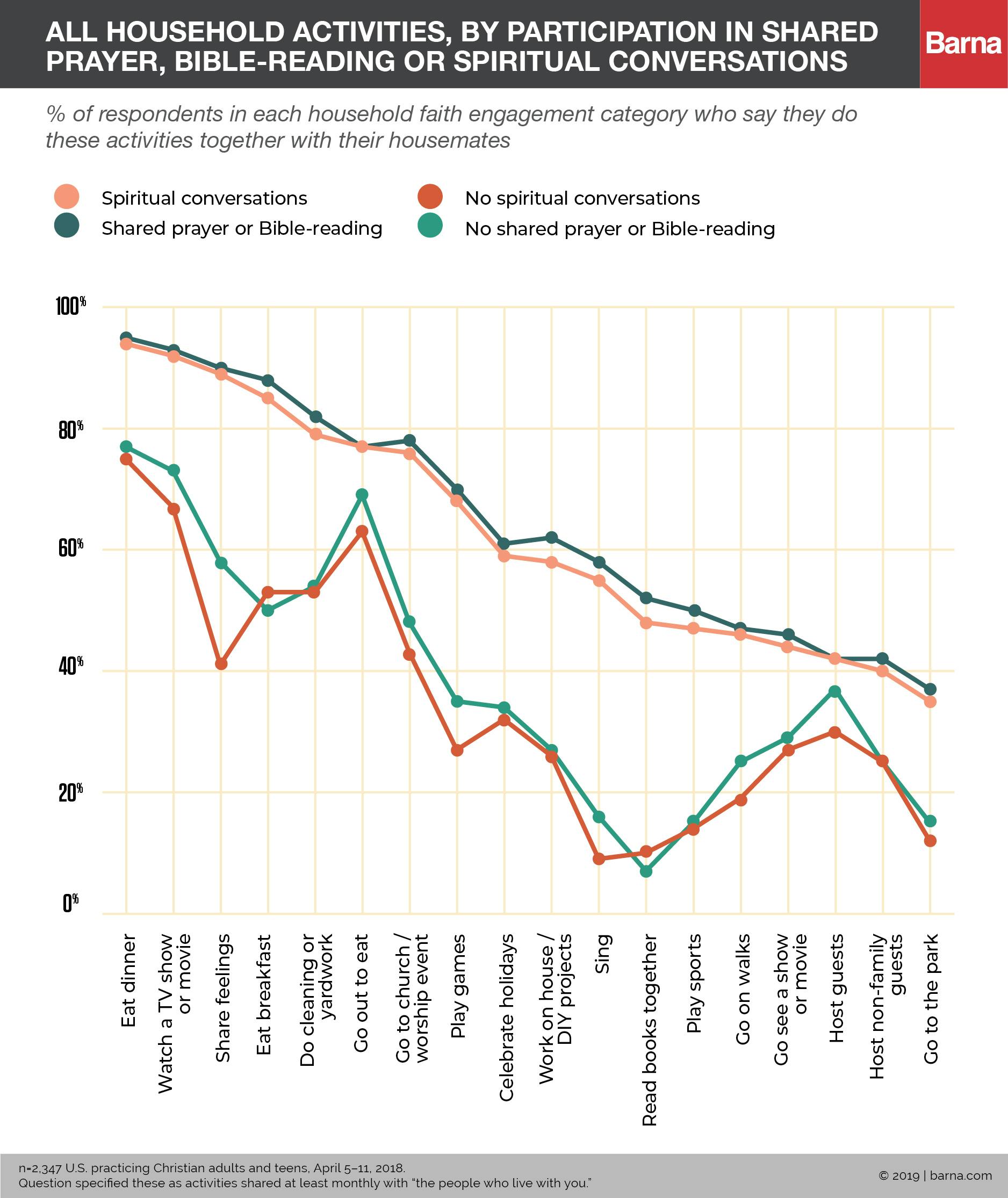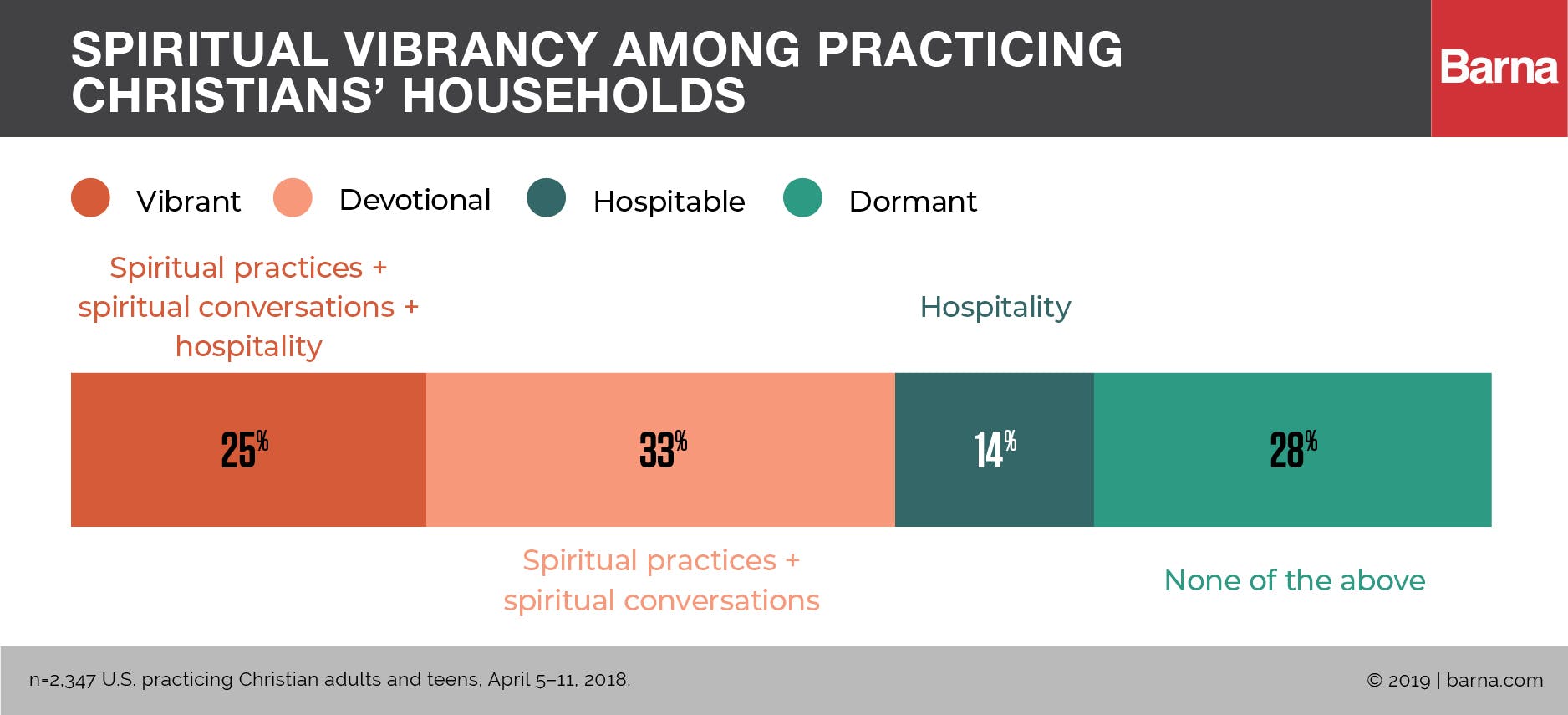
A game in the park with the kids. A backyard barbecue with neighbors. A Saturday afternoon spent tackling that yardwork you and your roommate have been putting off. These are all things that might make their way onto your household’s to-do list this time of year, as spring’s arrival makes it easier to spend more time outdoors or being active together. These are also things that, new Barna research shows, often coexist with spiritual vibrancy. The Households of Faith report, produced in partnership with Lutheran Hour Ministries and based on an extensive study of practicing Christians and their living arrangements, finds a consistent connection between households that prioritize quality time and households that prioritize faith formation.
Generally Active Households Are Spiritually Active Households
If we’re regarding any effort toward faith formation in the household as an outcome on its own, and if we’re seeking to understand what distinguishes the people who prioritize these efforts, it’s instructive to know that they are the same people who appear to make any activity a priority. Welcoming guests, watching TV, sharing breakfast and other routines and rituals are also common in households that carve out time to read the Bible, pray or talk about God together. Conversely, households that do not engage in faith-based group activities are much more likely to say they don’t do anything together (31% of those who do not have spiritual conversations, 23% of those who do not pray or read the Bible together).
In short, practicing Christians who intentionally cultivate a spiritual environment in their household are simply intentional to begin with. Good fun, good work and good faith seem to go hand in hand, indicating spiritual growth is yet another way of being present, interested and engaged in the lives of those around you, or vice versa. Barna has seen a similar correlation in some of its other reports, where positive tendencies are not exclusive, but hang together: In a study of perceptions of global poverty, the more someone cared about one issue, the more they cared about any injustice; in a study of vocation, the more someone was attuned to faith, the more they were attuned to their work. Similarly, in this study of Christian households, the more housemates engage in general activity, the more they engage in spiritual activity.
Vibrant Households Prioritize Togetherness
In this study, Barna also sought to learn from the households that appear to be exceptionally engaged in communal and consistent faith expression in the home. Barna developed a custom metric that sorts households by reports of collective, frequent engagement in key behaviors like:
- Spiritual practices—defined here as praying every day or two and reading the Bible weekly all together
- Spiritual conversations—defined here as talking about God and faith at least weekly all together
- Hospitality—defined here as welcoming non-family guests regularly, or at least several times a month
Based on these metrics, we created four key categories to describe practicing Christian households: Vibrant (25%), Devotional (33%), Hospitable (14%) and Dormant (28%).
Vibrant households stand out from the other groups in a range of behaviors—including in their commitment to togetherness and play. They have meaningful, fun, quality time with both their housemates and extended household members (which often include children). In fact, half call their household atmosphere “playful.” Every day or so, members of Vibrant households come together for games (32%), singing (31%), reading books (26%) or playing sports together (23%). They share meals (63% eat breakfast together and 75% eat dinner together) as well as their feelings (59%) on almost a daily basis. Vibrancy also correlates with group discipline, like working on the house or yard together (34% every day or two) or hosting household or family meetings (68%).
Devotional households, relatively distributed across different types of living arrangements, are not far behind, re-emphasizing the strong connection between housemates who are intentional about faith activities and housemates who are intentional about any activity. One-quarter plays games and sings together (23%) and one-fifth (21%) reads books together, though just 12 percent of Devotional households play sports together. While Devotional groups stop short of inviting others into their household, they do choose to go out to gather regularly with their church community (84% and 83%, respectively, attend church weekly).
Hospitable households align closely with other spiritually Vibrant traits. By definition, these two groups regularly welcome others into their homes several times a month, whether close friends (56% Vibrant, 58% Hospitable) or neighbors (28% and 26%, respectively). Christians in Hospitable households, one-fifth of which live with roommates, are less interactive with those who actually share their homes (17% play games together, 12% sing together, 10% read together), but they are still very likely to report having “friends who feel like family” (86%).
Dormant households, which see a large share of roommate contexts or couples living alone, are least associated with either fun or faith formation. They are significantly less likely than the other groups to play games (9%), sing (5%), read books (5%) or play sports together (3%). And though a majority (68%) says they have close friends in their life who feel like family, they are still the group least likely to maintain this strong sense of community.

What the Research Means
“One of the more surprising and encouraging findings from this study,” says Brooke Hempell, Barna’s senior vice president of research, “is that any sort of interaction—including just having fun—is correlated to faith formation. In other words, forming deeper bonds with our household members helps us grow our faith! The importance of fostering intimacy, sharing rituals and having fun with household members, as well as friends and other non-family guests who become a part of one’s extended household, cannot be overstated.
“Ministries have a duty to help their members understand and experience all of life as worship,” continues Hempell, “as well as to emphasize closeness, collaboration and fun as signs of life in the church. Churches that foster healthy spiritual growth should encourage Christians not only to know God but also to know their brothers and sisters in Christ, especially through gathering together outside the walls of the church. Our research finds that faith formation is best aided not just by services and sermons but by play and friendship as well.”
About the Research
About the Research
This study began with in-depth qualitative interviews with highly active Christians of various household types: two nuclear families (white Millennial parents with young children), one multi-generational family (Asian American household with children and boarders), one single-parent family (African American family that is sometimes multi-generational) and a roommate household (white Millennial males). Key insights about what makes a vibrant household or how faith grows in a household setting were initially identified through this research.
The results from the qualitative interviews were used to shape the questionnaire for quantitative online surveys conducted from April 5–11, 2018. In total, 2,347 interviews were conducted, including 448 with teens between the ages of 13–17. In order to qualify, respondents had to identify as Christian, agree strongly that their faith is very important in their life today and report attending a church service at least once in the past month. The margin of error for the total sample is +/- 1.8 percentage points at the 95 percent confidence level.
Individuals living by themselves are excluded from this study. This sample is not designed to be representative of all household types in the U.S. As the goal of this study is to observe interactions among practicing Christians who live together and how faith is experienced and transmitted among them, households of a single person did not qualify for participation.
Practicing Christians are self-identified Christians who say their faith is very important in their lives and have attended a worship service within the past month.
Photo by Thiago Cerqueira on Unsplash.
© Barna Group, 2019.
About Barna
Since 1984, Barna Group has conducted more than two million interviews over the course of thousands of studies and has become a go-to source for insights about faith, culture, leadership, vocation and generations. Barna is a private, non-partisan, for-profit organization.
Related Posts

The Powerful Influence of Moms in Christians’ Households
- Family
-
From the Archives

How Faith Heritage Relates to Faith Practice
- Faith
-
From the Archives
Lead with Insight
Strengthen your message, train your team and grow your church with cultural insights and practical resources, all in one place.
Get Barna in Your Inbox
Subscribe to Barna’s free newsletters for the latest data and insights to navigate today’s most complex issues.






